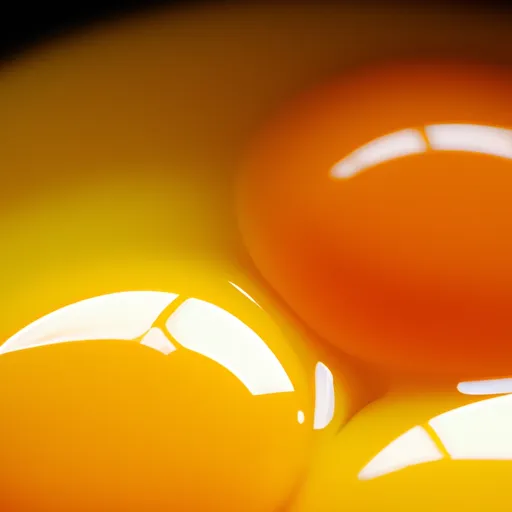Why do some Eggs have Darker Yolks? The Science behind the Color
Have you ever cracked open an egg and noticed that its yolk was a deeper shade of yellow than usual?
If so, then you’ve witnessed firsthand the difference between light and dark yolks. But what causes this variation in color?
And is there any nutritional value to be found in darker yolks?
In this article, we’ll explore these questions and more as we delve into the science behind why some eggs have darker yolks.
The Science Behind Egg Coloration
Eggshell colors are determined by genetics, but the color of the yolk depends on several factors. One major factor is the hen’s diet.
Hens that eat foods rich in carotenoids – pigments found in plants like corn, alfalfa, and marigolds – will produce eggs with darker yolks.
Carotenoids are responsible for giving fruits and vegetables their vibrant hues, and they also provide important antioxidants that can help protect against disease.
When consumed by hens, these pigments are stored in the fatty tissues of the ovaries and deposited into the egg yolks during ovulation.
Nutritional Value of Darker Yolks
So, does the color of an egg yolk indicate anything about its nutritional content?
Yes and no. While there isn’t necessarily a direct correlation between the darkness of an egg yolk and its nutrient density, studies suggest that eggs with darker yolks may contain higher levels of certain vitamins and minerals.
For example, one study published in the Journal of Agricultural and Food Chemistry found that eggs from hens fed a diet high in omega-3 fatty acids had significantly higher levels of DHA (an essential omega-3) in their egg yolks compared to control groups.
Additionally, research has shown that eggs with darker yolks tend to have slightly higher concentrations of vitamin A and iron than lighter-colored yolks.
See also What Breed of Chicken is Lavender?
How to Choose Quality Eggs with Dark Yolks
If you’re interested in incorporating more dark-yolk eggs into your diet, it’s important to choose quality eggs from reputable sources.

Look for eggs that come from free-range or pasture-raised hens, which are often allowed to roam freely and consume a diverse range of natural plant materials.
These types of hens typically produce eggs with darker yolks due to their varied diets.
You should also look for eggs that are organic and non-GMO, as these certifications ensure that the hens were raised without the use of synthetic pesticides or GMO feed.
Why You Should Consider Using Darker Yolk Eggs
While the color of an egg yolk doesn’t necessarily indicate its nutritional value, there are many reasons why you might want to consider using darker yolk eggs in your cooking.
They offer a unique flavor profile and can add visual appeal to dishes like omelets and frittatas.
Plus, choosing quality eggs from free-range or pasture-raised hens can support sustainable farming practices and promote better animal welfare.
So next time you’re at the grocery store, don’t be afraid to reach for those deep orange yolks!
